RadioCodeDatabase — all-in-one Windows suite for car radio codes 
What it is
RadioCodeDatabase v1.9 (2024) is an offline toolkit that helps owners and workshops retrieve factory radio/security codes for many OEM head units. The app unifies multiple calculators and brand databases in a single, fast interface.

Key modules & databases
What’s new in this build
How it works (typical flow)
Supported brands at a glance
VAG (VW, Audi, Škoda, SEAT), Renault, Dacia, Ford, Toyota, Becker, Grundig, Philips, GM (Chevrolet, Opel/Vauxhall), Chrysler, Fiat/Alfa/Continental, PSA (Citroën/Peugeot), Delco.
Good practice: always verify the head-unit model/serial format, ensure stable power during entry, and keep a record of the retrieved code for future service notes.
Tested environment
Verified on Windows 10 LTSC (2019). Also operates on Windows 7, 8/8.1, 10, 11.
Minimum requirements
• CPU: 1 GHz+ • RAM: 2 GB+ • Disk: ~200 MB free • Display: 1280×720+ • Connectivity: offline use (no permanent internet required).
Disclaimer
This post summarizes publicly available information for educational/archival purposes. Any files mentioned are hosted externally by unknown contributors, our forum does not claim ownership and does not distribute proprietary content. If you are a rights holder, contact us for prompt assistance.
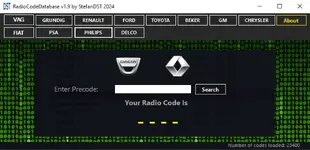
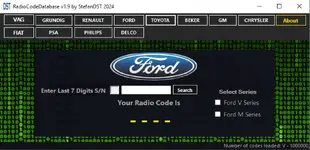
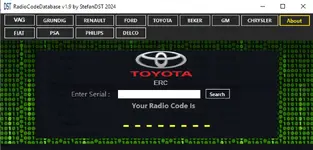
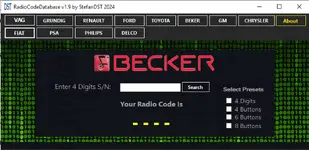
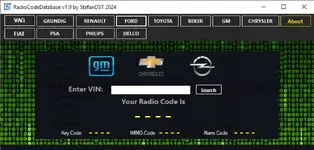
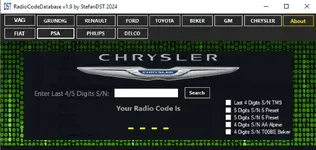
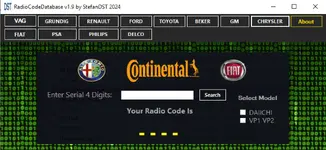
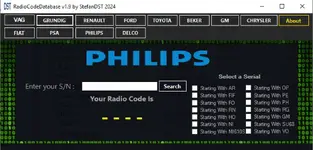
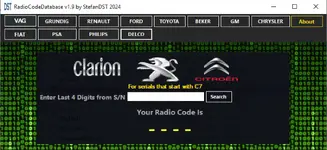
What it is
RadioCodeDatabase v1.9 (2024) is an offline toolkit that helps owners and workshops retrieve factory radio/security codes for many OEM head units. The app unifies multiple calculators and brand databases in a single, fast interface.
Key modules & databases
- VAG (Volkswagen, Audi, Škoda, SEAT): serial-number database lookup. Currently ~660,000 serials loaded.
- Philips calculator: database of 14M+ codes for Philips-made units. Handy checkboxes let you filter by serial prefix (AR, FIF, FO, RN, HO, NI, MI610S, OP, PE, PH, RG, GM, SU68, VO and more).
- Grundig calculator: database of 7M+ codes covering numerous Grundig radios used across different brands.
- Renault/Dacia calculator: computes the code from the last four digits of the serial (the precode, e.g., A100).
- Ford calculator: full databases for V-series and M-series units (enter the last 7 digits).
- Toyota ERC: ERC algorithm support (with ongoing improvements).
- Becker calculator: hybrid algorithm + database for 4-digit units and 4/6/8-button families.
- GM database: VIN-based lookups. Returns radio code, key code, IMMO code and alarm code. (In progress — ~509,000 VINs currently.)
- Chrysler mode: algorithm + database for multiple unit types (4/5-digit S/N variants including Alpine and Becker presets).
- FIAT / Continental: DAIICHI, VP1, VP2 support (enter 4-digit serial where applicable).
- PSA / Clarion C7: quick calculator for Citroën/Peugeot Clarion units with C7 serials (last 4 digits).
- Delco (CDR2005, CDR500): support for serials starting with GM02051/GM0205X/GM0205Y/GM15001/GM1500X/GM1500Y.
What’s new in this build
- Added 1200 new VAG serials.
- Minor bug fixes and stability tweaks.
- Unified UI — all calculators now open in the same window for faster workflow.
How it works (typical flow)
- Choose your brand/module (e.g., VAG, Ford, Renault/Dacia, GM).
- Enter the requested identifier (Serial / Precode / last digits / VIN).
- Press Search — the tool queries the relevant database/algorithm and displays the original code.
- Record the code before switching modules; save/print as needed.
Supported brands at a glance
VAG (VW, Audi, Škoda, SEAT), Renault, Dacia, Ford, Toyota, Becker, Grundig, Philips, GM (Chevrolet, Opel/Vauxhall), Chrysler, Fiat/Alfa/Continental, PSA (Citroën/Peugeot), Delco.
Good practice: always verify the head-unit model/serial format, ensure stable power during entry, and keep a record of the retrieved code for future service notes.
Tested environment
Verified on Windows 10 LTSC (2019). Also operates on Windows 7, 8/8.1, 10, 11.
Minimum requirements
• CPU: 1 GHz+ • RAM: 2 GB+ • Disk: ~200 MB free • Display: 1280×720+ • Connectivity: offline use (no permanent internet required).
Disclaimer
This post summarizes publicly available information for educational/archival purposes. Any files mentioned are hosted externally by unknown contributors, our forum does not claim ownership and does not distribute proprietary content. If you are a rights holder, contact us for prompt assistance.








